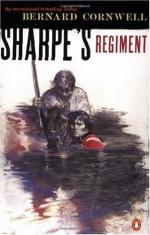
|
| Name: _________________________ | Period: ___________________ |
This test consists of 5 short answer questions, 10 short essay questions, and 1 (of 3) essay topics.
Short Answer Questions
1. How much time does the negotiations between Anne and Fenner take?
2. What does Sharpe and his group do when they go to Foulness?
3. What does Anne do when Sharpe is being arrested?
4. What is being organized in London as Fenner and Simmerson watch?
5. How does Jane feel about Simmerson's corruption?
Short Essay Questions
1. What does Sharpe do about Sergeant Lynch?
2. What does Anne tell Sharpe about him wanting to take Fenner and Simmerson down?
3. What does Sharpe decide to do after speaking with Anne?
4. Where does Girdwood run and what does he do?
5. What does Lawford with his information?
6. What does Anne tell Sharpe and how does Sharpe feel about her information?
7. What does Anne do about Sharpe being arrested?
8. What does Fenner do when Anne confronts him about Sharpe's arrest?
9. What does Sharpe do with the men at Foulness after he sets up the new command structure?
10. What do Sharpe and Harper hear about when they return to London?
Essay Topics
Write an essay for ONE of the following topics:
Essay Topic 1
Most of the entire series of novels concerning Richard Sharpe takes place during the Napoleonic Wars; therefore, understanding the political and social situation during that time helps to a greater understanding and appreciation of this book and others in the series. Discuss one of the following:
1. Research and write an expository essay about how the Napoleonic Wars begin and end.
2. Research and write an expository essay about the battles that take place on land between Britain and France during the Napoleonic Wars.
3. Compare/contrast the importance of the British infantry during the Napoleonic Wars to the importance of the British infantry during either WWI or WWII.
4. Write an expository essay on how the Napoleonic War affects the social culture of one of the following countries: Britain, France, or Germany.
Essay Topic 2
Cornwell has tried as much as possible to use historical events and facts around which to weave his work of fiction. Discuss the following:
1. Do you think Sharpe's Regiment qualifies as an historical fiction? Why or why not?
2. If much of the events in the book are historical, what surprises you about the way the events play out?
3. Do you think the culture of that era is more or less advanced than you imagined? Explain.
Essay Topic 3
Girdwood is the primary antagonist in the novel and a completely deplorable character, although Simmerson and Fenner are indeed close seconds.
1. Why do you think Girdwood is still in the military? Discuss his motives and the military's motives for allowing him to stay. Use examples from Sharpe's Regiment to support your answer.
2. What do you think would happen to Girdwood if he served in the U.S. Army and still did the crimes he did? Compare the modern concept of criminals in the military with that of the era of Sharpe's Regiment.
3. Girdwood seems to be not only despicable, but pitiable. Discuss the concept of characters who though despicable can also be pitied. Use examples from Sharpe's Regiment to support your answer.
|
This section contains 1,000 words (approx. 4 pages at 300 words per page) |

|




